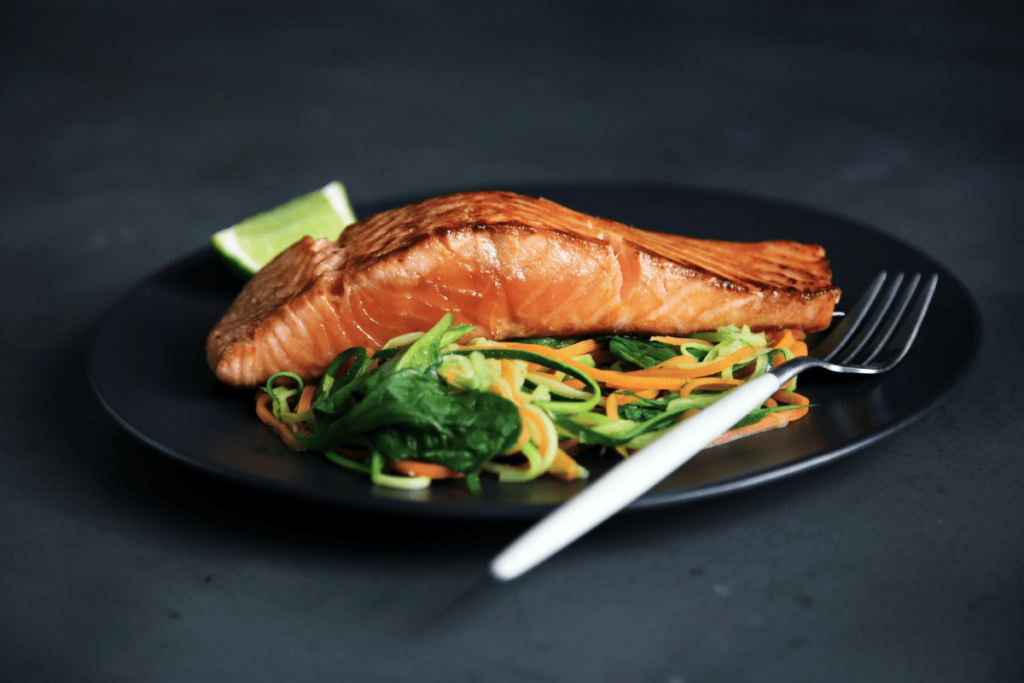As a pregnant woman, you must be mindful of what you eat since it directly impacts your baby’s health. Fish, especially raw fish, is a delicacy for many people, but it poses a potential risk for pregnant women. Eating contaminated fish can cause infections and increase the risk of miscarriage, preterm birth, and low birth weight. In this article, we will explore the question “Can I eat fish when I’m pregnant?” in detail and provide you with the necessary information to make informed decisions about your diet during pregnancy.

Risks of Eating Raw Fish During Pregnancy
Eating raw or undercooked fish during pregnancy is not recommended due to the risk of contracting bacterial or viral infections that can be harmful to both the mother and the baby. Raw fish, such as sushi, sashimi, and ceviche, can contain harmful bacteria, viruses, and parasites like Listeria, Salmonella, Vibrio, and Anisakis, which can cause food poisoning and infections.
Listeria, a bacterium found in contaminated foods, can cause listeriosis, a serious infection that can lead to miscarriage, stillbirth, premature delivery, or life-threatening infections in newborns. Pregnant women are 10 times more likely to contract listeriosis than the general population. Salmonella, another bacterium that can cause food poisoning, can lead to severe diarrhea, fever, and dehydration.
Anisakis, a parasitic worm found in raw or undercooked fish, can cause anisakiasis, a gastrointestinal infection that can lead to severe abdominal pain, vomiting, and diarrhea.
Benefits of Eating Fish During Pregnancy
Fish is an excellent source of essential nutrients like omega-3 fatty acids, protein, vitamin D, and minerals that are crucial for fetal development, brain function, and overall health. Omega-3 fatty acids, specifically EPA and DHA, play a critical role in the development of the baby’s brain, eyes, and nervous system. They also help prevent preterm labor, preeclampsia, and postpartum depression.
Pregnant women who consume fish regularly have been shown to have lower risks of preterm birth, low birth weight, and developmental delays in their babies. Fish also helps boost the immune system and reduces the risk of chronic diseases like heart disease, stroke, and diabetes.
Precautions to Take When Consuming Fish During Pregnancy
To minimize the risks associated with consuming fish during pregnancy, pregnant women should take the following precautions:
- Avoid eating raw or undercooked fish.
- Limit consumption of high-mercury fish like swordfish, shark, king mackerel, and tilefish.
- Choose low-mercury fish like salmon, trout, cod, and sardines.
- Make sure the fish is cooked thoroughly, and the internal temperature reaches at least 145°F.
- Avoid eating refrigerated smoked fish, which can harbor Listeria.
- Wash hands and utensils thoroughly before and after handling fish.
How to Choose Safe Fish During Pregnancy
When selecting fish during pregnancy, it’s crucial to choose safe and healthy options. Pregnant women should pick fish that are low in mercury and high in omega-3 fatty acids. Here are some tips for choosing safe fish during pregnancy:
- Avoid high-mercury fish like swordfish, shark, king mackerel, and tilefish.
- Choose low-mercury fish like salmon, trout, cod, and sardines.
- Check for advisories on local fish and shellfish in your area, as some may be contaminated with pollutants.
- Make sure the fish is fresh and properly stored.
- Cook the fish thoroughly to an internal temperature of at least 145°F.
- Avoid eating raw or undercooked fish, including sushi, sashimi, and ceviche.
- Wash hands and utensils thoroughly before and after handling fish.
By following these guidelines, pregnant women can enjoy the many health benefits of fish while minimizing the risks associated with consuming contaminated fish.

The Best Types of Cooked Fish to Eat During Pregnancy
Cooked fish is generally safer to consume than raw or undercooked fish. The following types of cooked fish are considered safe for pregnant women to eat:
1. Salmon
Salmon is a low-mercury fish that is rich in omega-3 fatty acids, protein, vitamin D, and B vitamins. It’s a healthy choice for pregnant women and can be baked, grilled, or pan-seared.
2. Trout
Trout is another low-mercury fish that is rich in omega-3 fatty acids and protein. It’s an excellent choice for pregnant women and can be baked, grilled, or broiled.
3. Cod
Cod is a low-mercury fish that is rich in protein, vitamin B12, and selenium. It’s a versatile fish that can be baked, broiled, or pan-seared.
4. Sardines
Sardines are a low-mercury fish that is rich in omega-3 fatty acids, protein, vitamin D, and calcium. They can be grilled, baked, or canned.
The Worst Types of Cooked Fish to Avoid During Pregnancy
The following types of cooked fish are high in mercury and should be avoided during pregnancy:
1. Swordfish
Swordfish is a high-mercury fish that should be avoided during pregnancy. It can cause developmental delays in the baby and is linked to a higher risk of autism.
2. Shark
Shark is a high-mercury fish that should be avoided during pregnancy. It can cause brain damage and developmental delays in the baby.
3. King Mackerel
King mackerel is a high-mercury fish that should be avoided during pregnancy. It can cause developmental delays in the baby and is linked to a higher risk of autism.
4. Tilefish
Tilefish is a high-mercury fish that should be avoided during pregnancy. It can cause brain damage and developmental delays in the baby.
Nutritional Value of Fish During Pregnancy
Fish is a highly nutritious food that contains essential nutrients for fetal development and maternal health. The following nutrients are found in fish:
- Omega-3 fatty acids (EPA and DHA)
- Protein
- Vitamin D
- Vitamin B12
- Iron
- Zinc
- Selenium
- Iodine
How Much Fish Can You Eat During Pregnancy?
The FDA recommends that pregnant women consume 2-3 servings of low-mercury fish per week, each serving being 4-6 ounces. They should also avoid consuming high-mercury fish and limit their consumption of canned tuna to 6 ounces per week.
Final Thoughts
Pregnant women should avoid eating raw or undercooked fish due to the risk of bacterial and parasitic infections. Cooked fish is generally safe to consume and is highly nutritious, providing essential nutrients like omega-3 fatty acids, protein, and vitamins. Pregnant women should take precautions when choosing and preparing fish to minimize the risks associated with consuming contaminated fish.
Frequently Asked Questions – FAQs
It’s generally not recommended to consume raw or undercooked fish during pregnancy, including sushi.
Refrigerated smoked salmon can harbor Listeria and should be avoided during pregnancy.
Pregnant women should limit their consumption of canned tuna to 6 ounces per week.
Yes, eating contaminated fish can increase the risk of miscarriage, stillbirth, and preterm birth.
